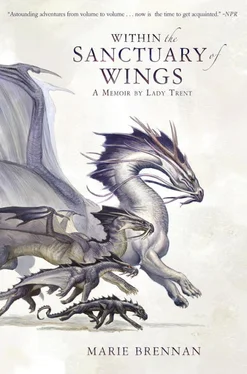“Two,” I whispered back. “Esmin is local, but Habarz is something like a head priest for the whole Sanctuary. Why?”
Suhail’s answering smile was more than a little tinged with nerves. “I put my time waiting to what I hope will be good use.”
Moving slowly, so as not to startle anyone, Suhail approached Habarz. The shouting abated, except in a few quarters; Esdarr very much wanted to step forward and protect the elders. But Suhail stopped a safe distance away and knelt. Then, in a voice strong and clear, he recited words I could only partially make out—words in an approximation of the Draconean language.
It was one of the texts he had been working on back in Scirland. His transliteration of the script was imperfect, his pronunciation flawed, and the language itself was even more archaic than the religious form used in the Sanctuary… but it was recognizable. The words were a prayer to the sun, that it guide the beneficiary down the right path.
If my own first speech had been akin to a yak standing up on its hind legs and saying hello, now the yak was leading a worship service. The reactions would have been comical, had the situation not been so tense; as it was, I still had to stifle a laugh. Habarz stared at Suhail with his wings drooping so their tips almost trailed in the mud. The shouting stopped utterly; the only voices I heard were villagers murmuring to one another, asking what on earth the human had just said.
Kuvrey was the first to recover her wits. “Quite remarkable,” she said dryly. “But I think we need more than the sun to help us now.”
“Then let my companions help,” I said. “I will vouch for them. And call for all the aid you like, neighbouring villages with their knives and their spears; you may need them. But please, do not hurt these men.”
The elders stepped aside to confer with the ruling sister-group of Imsali. Suhail rose and returned to my side, not even bending to brush the mud off his knees. Thu was watching all of this with an unreadable expression: wariness, perhaps, but also very rapid thought. I did not know him well enough to guess at those thoughts.
When the elders came back, I knew by Sejeat’s posture that I was not going to like what they had decided. “You may make your picture,” Kuvrey said, “and meet with the humans. But we will hold these two.” She gestured at the men. “If the others coming here are as dangerous as you say, then we must have protection against them.”
I swayed on my feet. Hostages. Suhail and Thu would be hostages after all. If I failed in my goal…
It took me an agonizingly long time to force my reply into Draconean. “I cannot—” The word “promise” had fled my mind. “The men who come in the basket, I do not control them. I will try. But my trying may not be good enough.” My companions were looking on, uncomprehending; they could see only that a sudden wave of fear had come over me.
“With these two in our keeping,” Kuvrey said, “you will try your very best.”
* * *
I scarcely slept a wink that night. A good deal of time was taken up in creating the sign I needed; there was no proper paint in the village, but the white lime ordinarily used to plaster the yak barn served well enough. I also had to discuss with the villagers the best place to lay that sign out. We needed a suitably large and flat meadow, where the snow had melted enough that my sign would be visible to a caeliger entering through the col, and the craft would have a reasonable chance of landing. And of course we had to negotiate the specifics of who would be where when that happened—my human companions included.
After that, though, there were still some hours in which I might have slept. I passed them instead in Suhail’s arms, trembling with nerves. “I am so sorry,” I murmured, knowing the words were laughably inadequate. “I should not have brought you here.”
His arms tightened around me. “To Imsali?”
“Or the Mrtyahaima.”
“Don’t be absurd,” he said lightly. “I wanted to come—well, not quite as much as you did, because that would be difficult to equal. But I certainly would not have sent you off without me. And if you had not come, none of this would have happened, good or bad.”
“But you are a hostage now, because of me. I should have sent you back across the col. Back to Vidwatha, where you could warn someone—”
This time the pressure of his arms was stronger. “Don’t even think of it. No force in the world could have persuaded me to leave you. Not when I had just found you again.”
His words silenced me for a time. It was bravado to say I would have sent him away; I could no more have parted from him than he from me.
But the choice, in the end, might not belong to either of us.
“What if I don’t succeed?” I whispered. “What if—”
Suhail kissed the top of my head. “You’ll do very well. There is no one in the world better suited to this than you.”
A bitter, frightened laugh shook my body. “True. But only because there is no other human in the world who speaks their language.”
“That is not all of it—though I’ll grant that it’s a necessary precondition. But Isabella… you have thrown yourself into the thick of things before. You are fearless. Not in the sense that you feel no fear; I know better than to think you that foolish. But you do not let it hold you back, and there is power in that. You will hurl yourself in front of that caeliger and refuse to accept anything less than cooperation, and you will bend whoever has come to your will. I believe this, with all my heart.”
We lay in silence again, while I tried to ensure I could speak without my voice wavering too badly. When it was steady at last, I said, “All the same. I want you and Thu both to be prepared to do… whatever you have to.” Defend yourselves, I thought. Run away. Whatever it took. I had lost one husband in the mountains; I would not lose another.
“We will,” Suhail promised. “Now sleep.”
Perhaps I did, a little. But my memory is of an all-too-short time at his side, before Suhail rose for his dawn prayer and Kahhe came to say it was time.
* * *
The worst part was the waiting.
I laid my sign out in the meadow we had chosen, just below the point at which the greenery of spring thinned out to the barren rock of the upper slopes. It was an enormous sheet made of yak-wool blankets hastily stitched together, a square of suspiciously regular brown, with a huge white star painted in its center—a shape snow was unlikely to melt into. Below that I had written “LAND HERE” in the largest letters the space allowed, but I could not be certain anyone would be able to read them from the air.
There were so many things I could not be certain of. What if they did not enter between Gyaptse and Cheja? There were other cols, or the river gorge through which the first caeligers had passed. I had no idea when the caeliger was coming; if its base was very far away, they might not return today, or even tomorrow. We might sit out here for a week without anything happening—and then I would wonder whether I should stay, or make my dash for the outside world in the hope of preventing more flights. (How I might do that, I could not even begin to guess.) They might overlook my sign, or crash in attempting to land, or see movement nearby and rake the ground with their rifles before touching down.
I had all the time in the world to think up one disaster scenario after another, for the caeliger did not come at dawn, nor at noon. The only mercy of this was that waiting dulled the edge of my fear, which cannot remain sharp for so long without something to hone it. The whetstone finally went to work in the early afternoon, when movement at the col drew my gaze. The caeliger had returned, and this time it looked like it would succeed in clearing the pass.
Читать дальше












